
Switzerland - AB - Appenzeller Bahnen
For a full scale picture, please click on the picture shown !
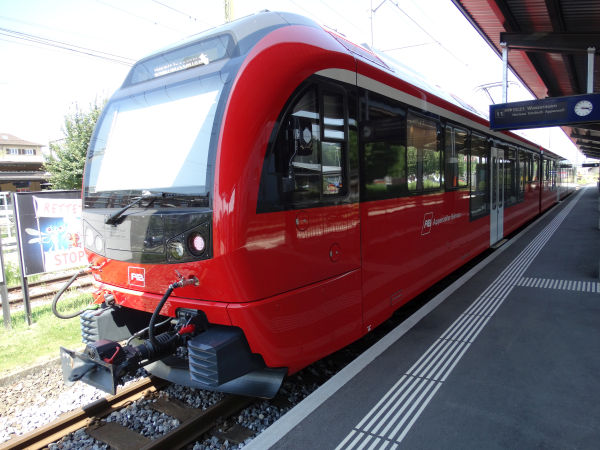
What is today Appenzeller Bahnen AB (Appenzell Railways) was in former days quite a collection of independent railway companies.
They had different electric systems and different gauge widths, some had rack rails, some did not. Today's AB consists of these former railways:
Appenzellerbahn AB, from Winkeln via Herisau and Urnäsch to Appenzell
St.Gallen - Gais - Appenzellbahn SGA
Altstätten - Gais - Bahn AG
Rorschach-Heiden-Bergbahn RHB
Rheineck–Walzenhausen-Bergbahn RhW
Trogenerbahn TB between St.Gallen and Trogen
Säntisbahn between Appenzell and Wasserauen.
During recent years Appenzeller Bahnen has seen a lot of modernisation works. This new Stadler-built train is one example. AB calls it "Der Walzer".
It is a three coaches long fixed electric multiple unit, low-floor. Similar trains were ordered at the same time by more than ten private narrow gauge
train operators. AB got its first new Walzer trains to the line from Gossau to Wasserauen in 2018.
Picture from Gossau 4.7.2019 by Ilkka Siissalo.
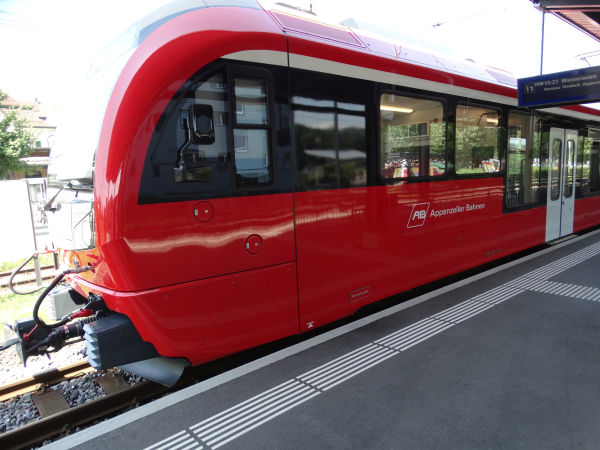
A closeup on the front of the new "Der Walzer" train by Stadler Rail.
Picture from Gossau 4.7.2019 by Ilkka Siissalo.
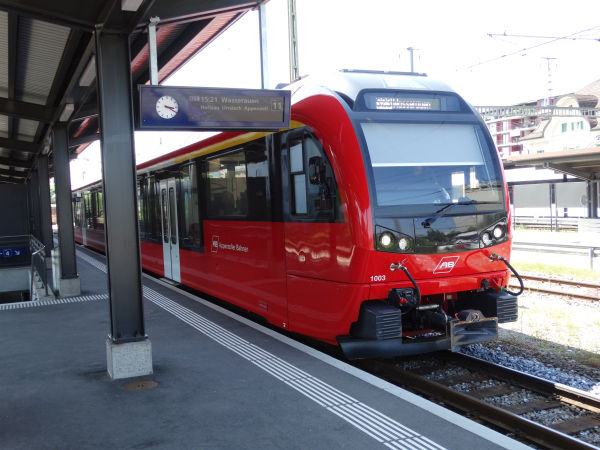
These new "Der Walzer" trains ABe 4/12 are purely adhesion railway trains. They are intended for the Gossau-Appenzell-Wasserauen line.
Picture from Gossau 4.7.2019 by Ilkka Siissalo.
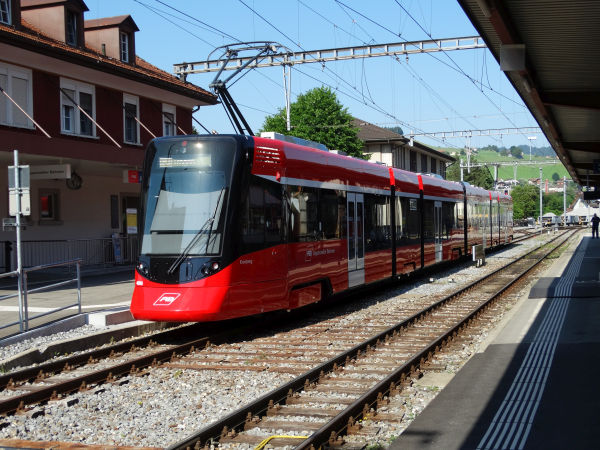
This new train is actually not basically a train at all, but it is a fixed set of two Stadler Tango trams modified and fitted back to back. The result is a
bidirectional vehicle, which is about 10 cm broader than a standard Tango tram, which has doors on both sides and which can legally speaking act both as a
train and as a tram. In 2006 a number of smaller rail companies were fused with Appenzeller Bahnen. One of them was the Trogenerbahn, which operated small,
tram-like trains from downtown St.Gallen to Trogen. Now a couple of new tunnels have been dug and the Trogenerbahn line has been coupled together with the
Appenzeller Bahnen line from St.Gallen to Appenzell. The result is what is in German called Durchmesserlinie, a through connection all the way from Trogen
via St.Gallen to Appenzell. Technically these tram-trains are interesting. Both the line St.Gallen to Trogen and St.Gallen to Appenzell are now 1500 V DC.
Earlier St.Gallen to Trogen was 1000 V DC. But still these tram-trains are dual-voltage machines as in the city centre of St.Gallen they operate officially
as trams and their overhead catenary wires cross those of the St.Gallener trolleybuses which use 600V DC. To avoid further technical problems, these
tram-trains run with 600V DC in the city centre and 1500V DC elsewhere. There is also now the additional point that to avoid the need of third rail cog-wheel
sections on the very steep line from St.Gallen up to Appenzell, a new tunnel had to be built and within this tunnel there is a section of the rail line which
climbs 80 promilles (8%) steep up towards Appenzell. That is now the new European record for the steepest adhesion only railway. It was the biggest task of
the renewal program of the Appenzeller Bahnen to remove the need for cog wheel trains between St.Gallen and Appenzell. This was done by building this new
Ruckhaldetunnel.
Picture from Appenzell 4.7.2019 by Ilkka Siissalo.
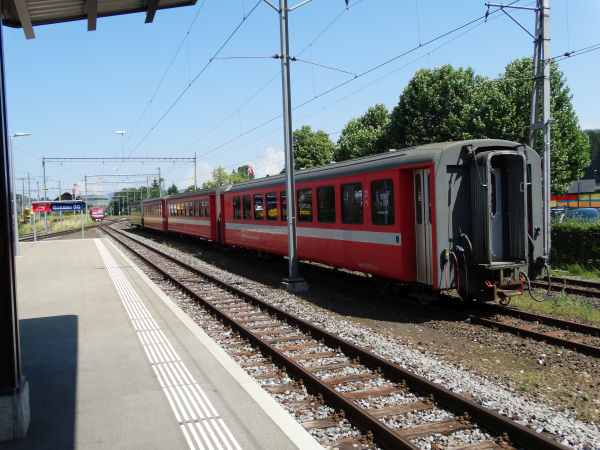
Typical lightweight coaches of the 1970s-1980s which AB has used for a long time on the meter gauge rack rail routes between St.Gallen and Appenzell.
Picture from Gossau 4.7.2019 by Ilkka Siissalo.
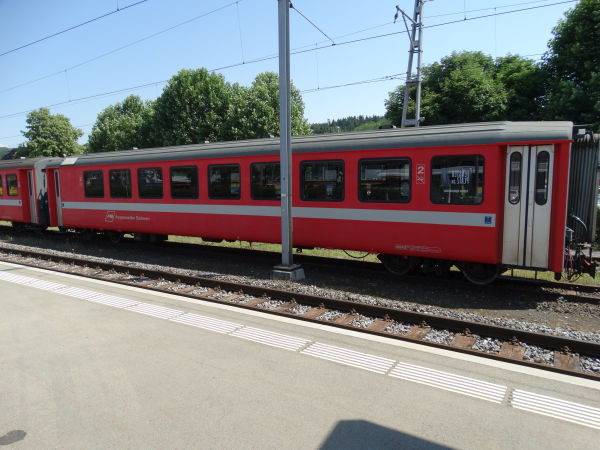
A closer look at one of the lightweight coaches. Very similar coaches have been used at other meter gauge mountain railways also, for example at
Rhätische Bahn.
Picture from Gossau 4.7.2019 by Ilkka Siissalo.
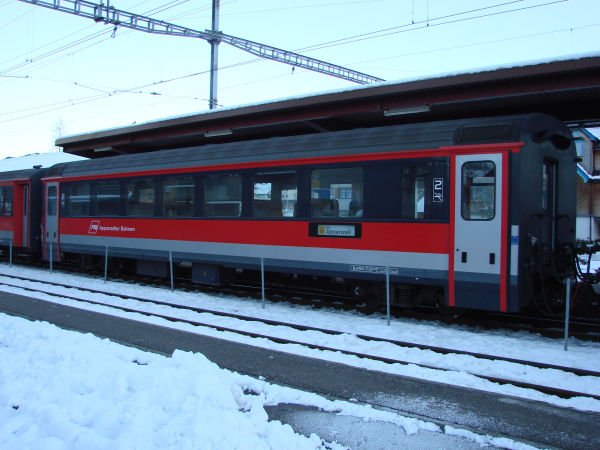
This middle coach B234 is from the year 1993. It is fitted with a vacuum toilet and new outward swinging doors. It does not have cog wheel breaking
mechanisms of its own, but it can nevertheless be used as a middle wagon in cof wheel fitted trains on the very steep gradient lines. Today these
coaches are used as extra capacity with the very new "Walzer" trains as needed.
Picture from Appenzell 29.12.2007 by Ilkka Siissalo.
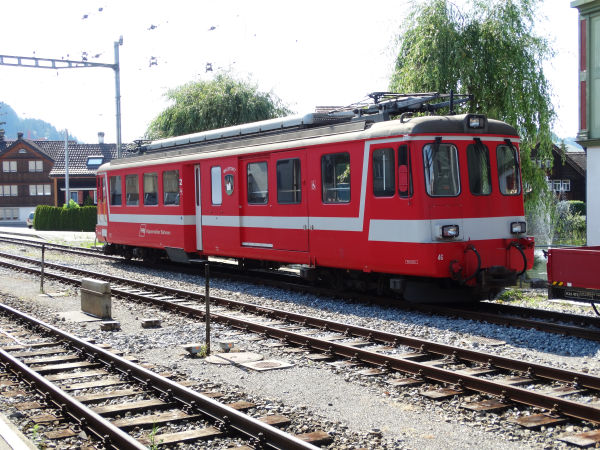
Motorwagon BDe 4/4 no.46 is from the year 1968. There were originally two similar motorwagons, no. 46 and 47, as well as one steering cab coach. Lightweight coaches
such as the ones pictured above, were used as additional capacity was needed. These motorwagons are metre gauge, operate on 1500 V DC and had originally a top speed
of 65 km/h, now 75 km/h. They have 32 seats. No.46 was named "Waldstatt" and no.47 "Urnäsch". These are purely adhesion trains and cannot run on the cog wheel rail
lines.
Picture from Appenzell 4.7.2019 by Ilkka Siissalo.
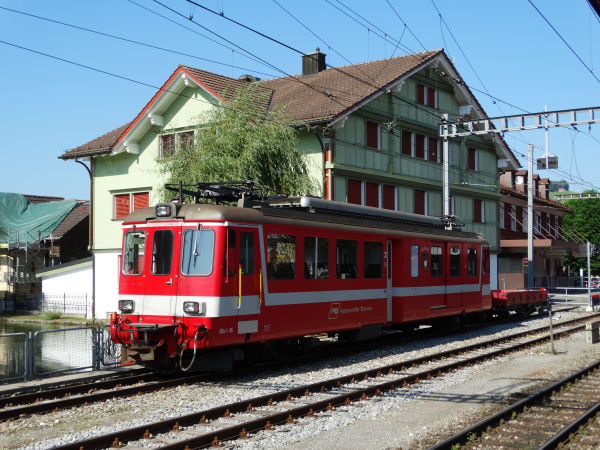
The same motorwagon BDe 4/4 no.46 as shown above, but seen from the other side. Lately it has been mainly used as a locomotive for trains for fixing the rails and other
infrastructure, not usually anymore for passenger traffic.
Picture from Appenzell 4.7.2019 by Ilkka Siissalo.
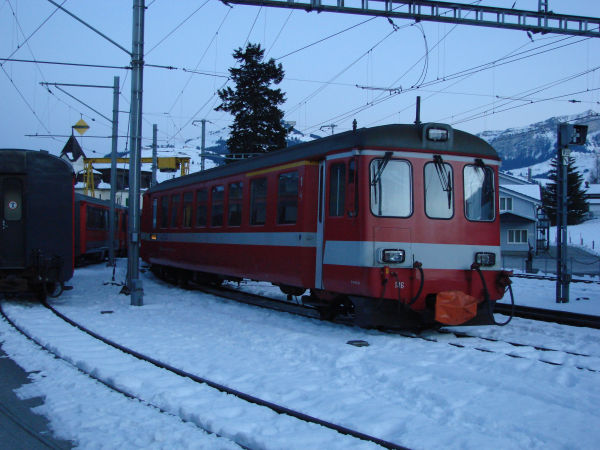
This steering cab coach no.146 was for a long time the pair of the motor wagon shown above. It also was built in 1968. It was thoroughly renovated in in 1998 and then
scrapped and broken to pieces in 2015 for lack of need.
Picture from Appenzell 29.12.2007 by Ilkka Siissalo.
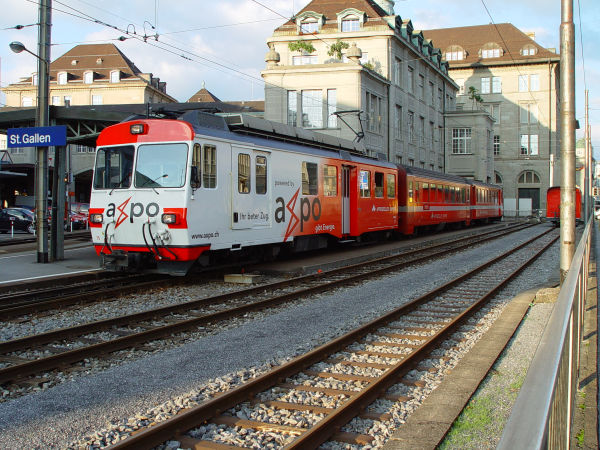
Motorwagon BDeh 4/4 no.15 was fitted for cog wheel, rack rail operation. No. 15 was named "Appenzell" and it was from 1981. In 2018 it was sold to Achenseebahn
in Austria.
Picture from St.Gallen 28.9.2002 by Ilkka Siissalo.
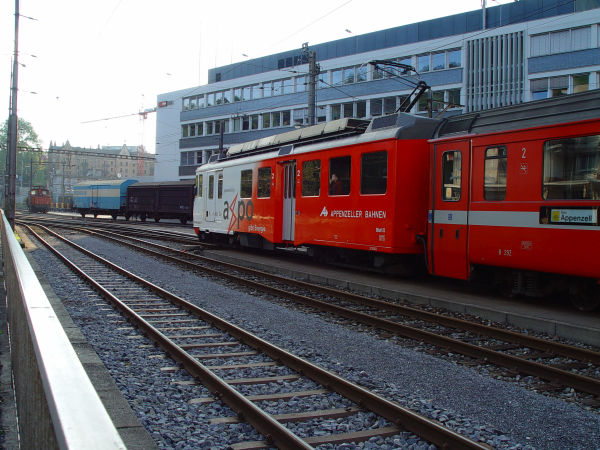
The same motorwagon BDeh 4/4 no.15 seen from the other direction. The middle coach of the train, B 292 was from the year 1993 and also it was fitted
for rack rail operation.
Picture from St.Gallen 28.9.2002 by Ilkka Siissalo.

Steering cab coach Abt no.112 of a traditional Appenzeller Bahnen train. This one is from the year 1981 and it was fitted for use in cog wheel drive trains for
the very steep 160 promille cog wheel rack rail routes. In 2018 it was sold to Austria's Achenseebahn together with the motor wagon 15 it normally worked with.
Picture from St.Gallen 28.9.2002 by Ilkka Siissalo.
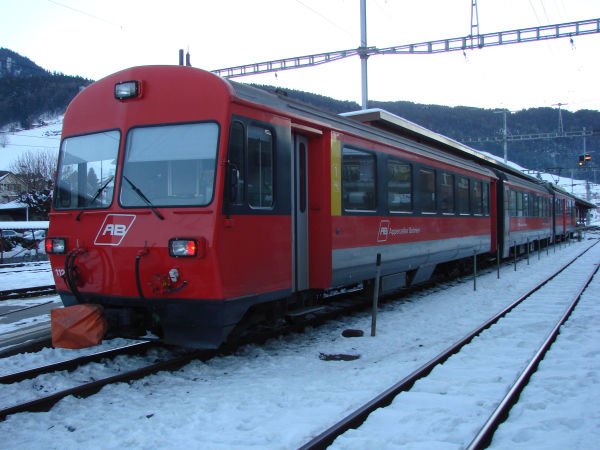
Steering cab coach ABt no.112 was from the year 1981. Here we see it shortly after a modernisation and a new painting. In 2018 this one was sold to
Achenseebahn of Austria. Today not even Achenseebahn uses these trains any more, they have new trams replacing them. See railpics.club > Austria > Achenseebahn.
Picture from Appenzell 29.12.2007 by Ilkka Siissalo.
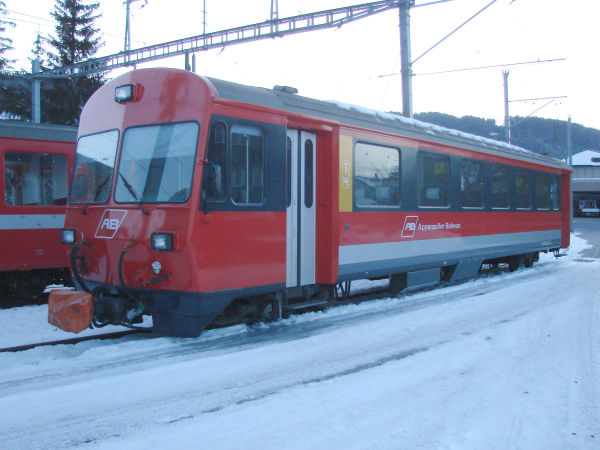
One of the type ABt steering wagons at the depot in Appenzell.
Picture from Appenzell 29.12.2007 by Ilkka Siissalo.
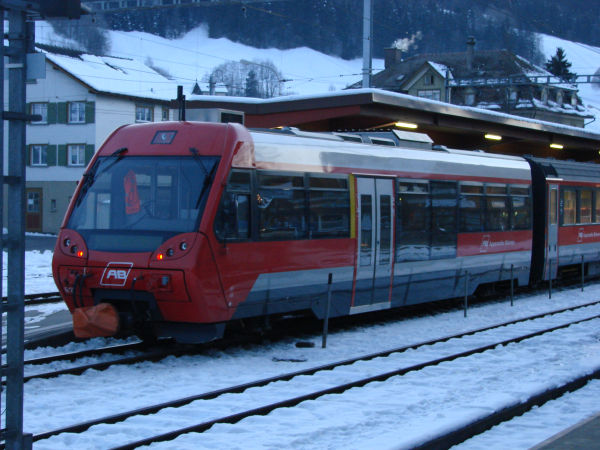
Steering wagon ABt no.122 is one of the three newest of Appenzeller Bahnen. The wagon is from the year 2004, but the bogies it lies on are from an earlier wagon
from 1993. There are three of these very modern steering cab wagons, nos.121-123.
Picture from Appenzell 29.12.2007 by Ilkka Siissalo.
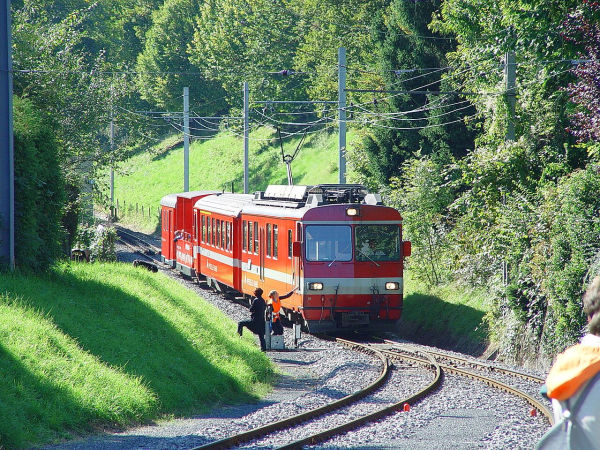
Motorwagon BDeh 4/4 no.16 was almost similar with the no.15 shown above, but it was newer, from the year 1993. For example the outwards swinging
doors were different and the chairs inside were more modern. Here it is coming downhill from a very steep rack rail line down to the station Altstätten.
Picture from Altstätten 29.9.2002 by Ilkka Siissalo.
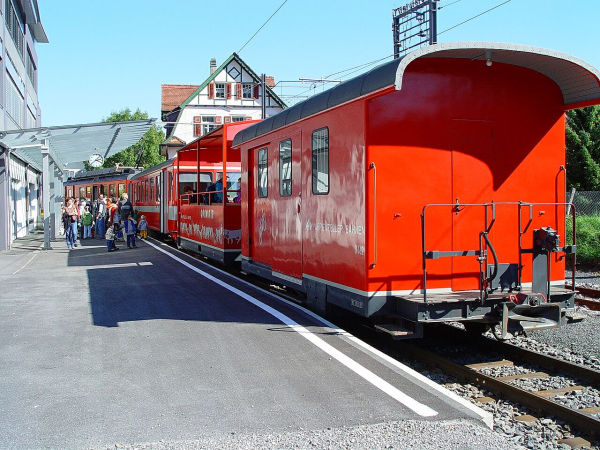
Same train as above. Motorwagon BDeh 4/4 no.16 had also an open summer wagon for tourists as well as a wagon for bicycles with it as it
came to the station of Altstätten.
Picture from Altstätten 29.9.2002 by Ilkka Siissalo.
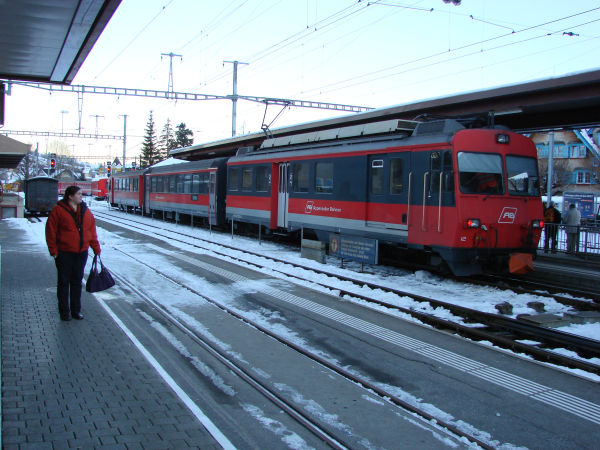
Appenzeller Bahnen BDeh 4/4 no.12 after modernisation and a new paint. The motor wagon is from 1981 and it is eqipped with a cog wheel drive
mechanism for the very steepest climbs.
Picture from Appenzell 29.12.2007 by Ilkka Siissalo.
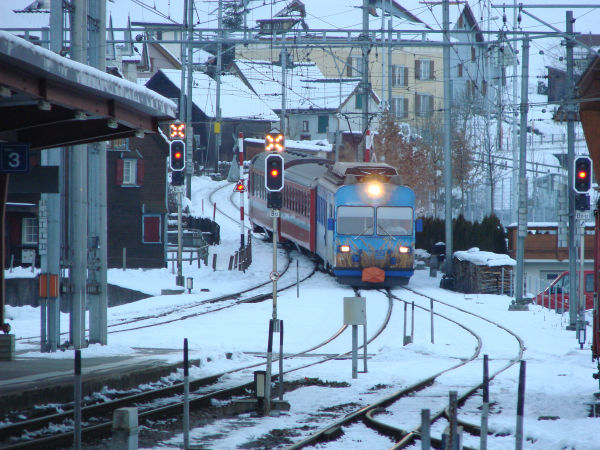
Appenzeller Bahnen BDeh 4/4 no.44 is leading a train coming from the direction of Gais - St.Gallen into the station of Appenzell.
Picture from Appenzell 29.12.2007 by Ilkka Siissalo.
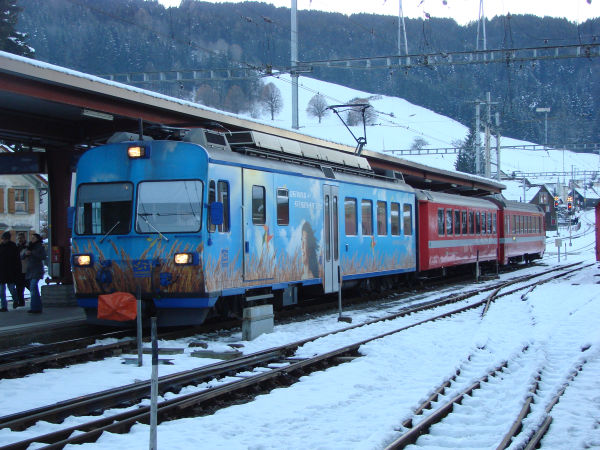
Same train as above after it reached the station of Appenzell. Motor wagon no.44 was totally covered by advertisement stickers of the company Ostwind,
advertising for wind energy. The motor wagon BDeh 4/4 no.44 is from 1993 and it was one of the second generation of BDeh 4/4 motor wagons, based on the
old concept from 1986 but in many ways modernised.
Picture from Appenzell 29.12.2007 by Ilkka Siissalo.
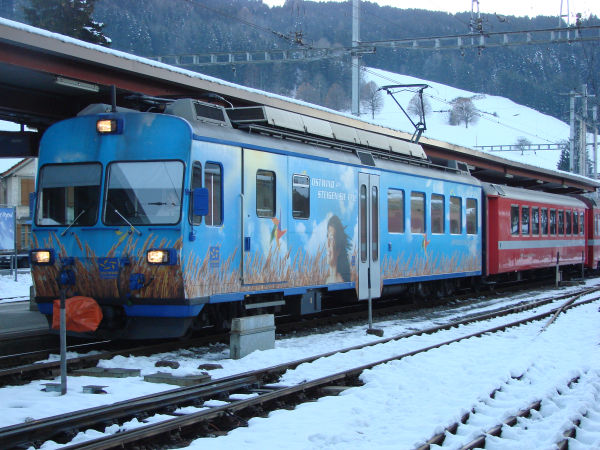
A closer picture of the Appenzeller Bahnen BDeh 4/4 no.44.
Picture from Appenzell 29.12.2007 by Ilkka Siissalo.
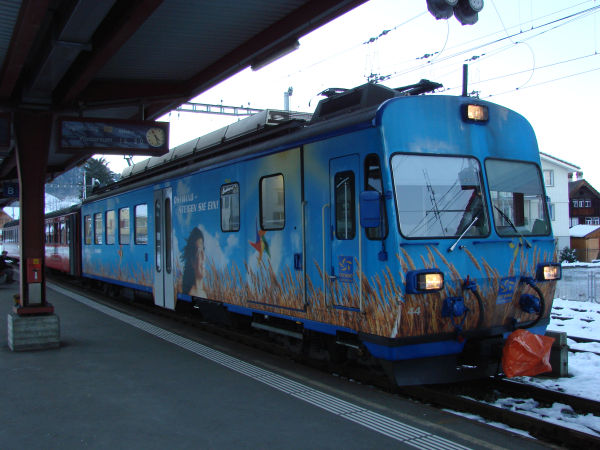
The same BDeh 4/4 no.44 seen from the other side. It was going to Wasserauen from Appenzell.
Picture from Appenzell 29.12.2007 by Ilkka Siissalo.
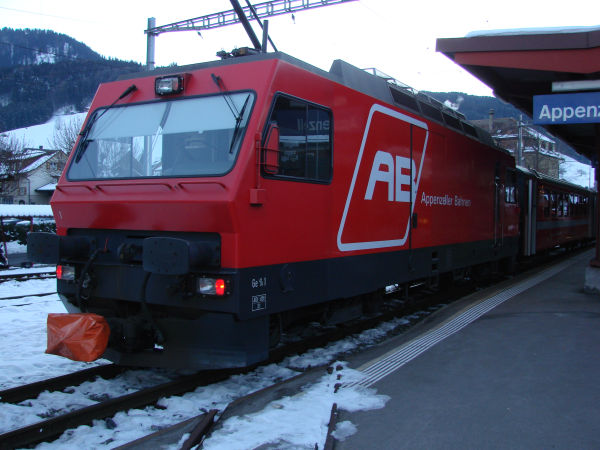
The whole Appenzeller Bahnen owns nowadays just one locomotive and to even see it is rare. Here it is, Ge 4/4 no.1. It is of the same type of private
narrow gauge locomotives which were more or less at the same time ordered by at least Mittelthurgaubahn, Bodensee-Toggenburgbahn, Südostbahn and a number of
others, but this one of course is narrow gauge, unlike some of the others, 1 metre gauge. But the machine is of 1 metre gauge without any cog wheel drive
systems, so it cannot handle the third rail cog wheel driven sections of Appenzeller Bahnen. At the time when it was ordered, there was still a substantial
amount of cargo wagon traffic on the AB network and it was thought that this modern locomotive would be needed for that. But in practise - like here -
it has been just a replacement for one more electric multiple unit motorwagon on the non-cog wheel drive routes in passenger trains.
Picture from Appenzell 29.12.2007 by Ilkka Siissalo.
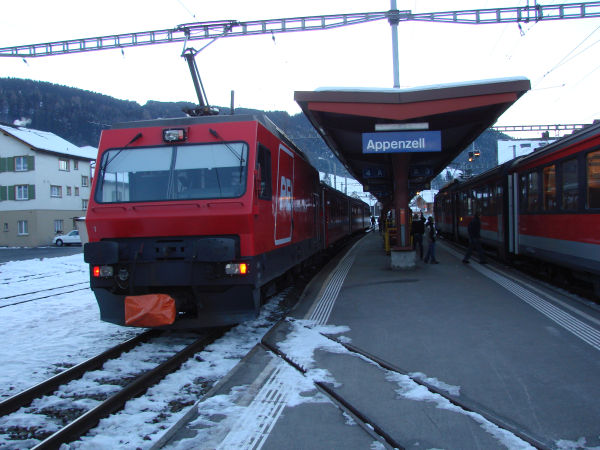
Here the only locomotive of AB is preparing to push a steering cab coach led passenger train from Appenzell forward to Urnäsch and Gossau.
Picture from Appenzell 29.12.2007 by Ilkka Siissalo.
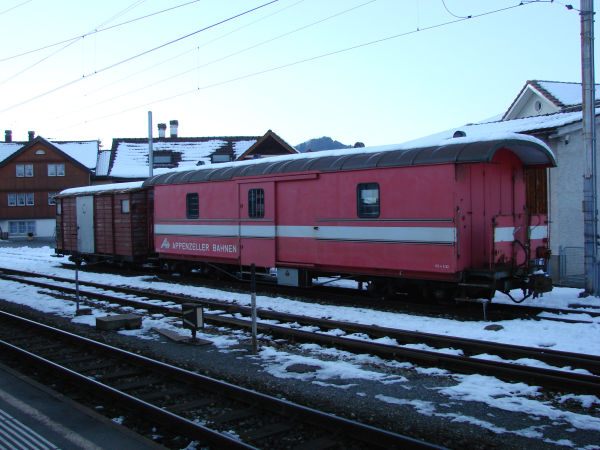
An old and seldomly used cargo wagon D166 at the Appenzell station. The wooden even older wagon behind it arried the markings of SGA,
St.Gallen-Gais-Appenzell-Bahn, so it must be even a lot older and just rusting away. The cargo wagon D 166 is originally from the year
1913 but it was modernised in 1982 and that is where the painting is from.
Picture from Appenzell 29.12.2007 by Ilkka Siissalo.
The former AB Appenzeller Bahn
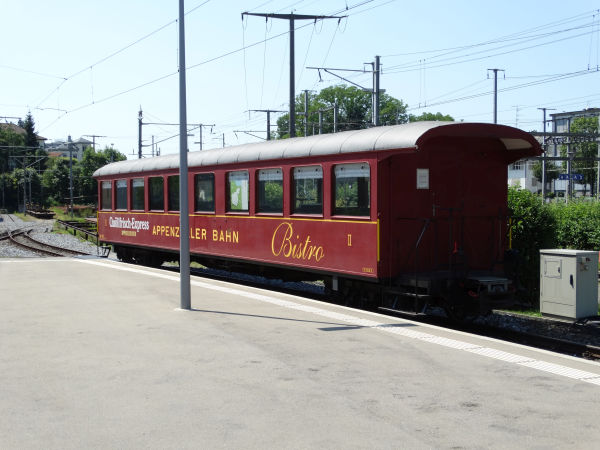
Tourism is important in Appenzellerland and especially during the summer months there is a lively business of touristic and historic trains
moving on the networks of AB. This bistro coach is from the time of the original Appenzeller Bahn AB, not the today's AB which is a collection
of companies.
Picture from Gossau 4.7.2019 by Ilkka Siissalo.
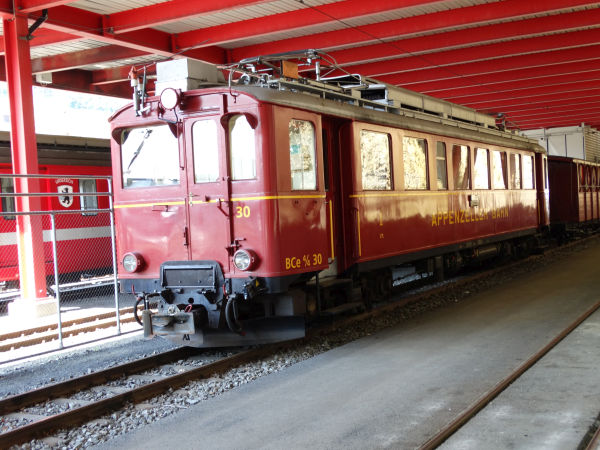
The historic motor wagon BCe 4/4 no.30 of the original Appenzeller Bahn AB is from the year 1933. It was built by SIG and MFO.
Picture from Herisau 4.7.2019 by Ilkka Siissalo.
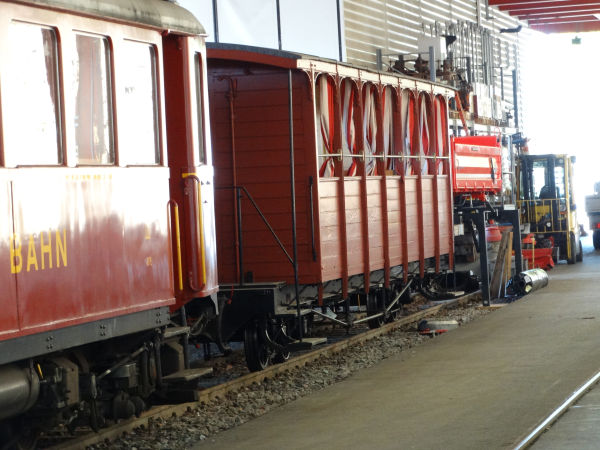
An old open summer wagon, modified from a four-axle cargo wagon.
Picture from Herisau 4.7.2019 by Ilkka Siissalo.
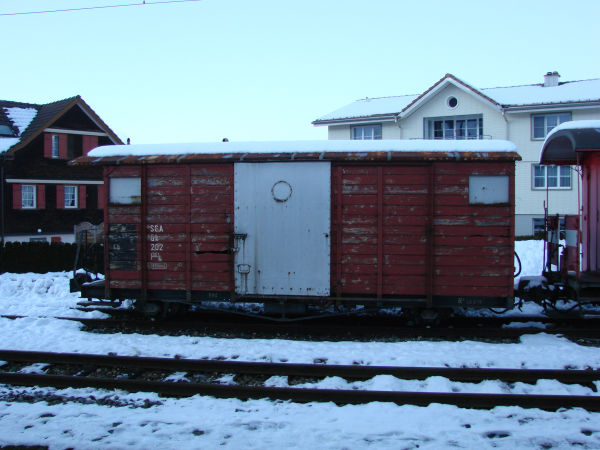
The very old cargo wagon SGA Gk no.203 used to belong to the St.Gallen-Gais-Appenzell railway SGA, a precursor of today's AB.
Picture from Appenzell 29.12.2007 by Ilkka Siissalo.
The former Rorschach-Heiden Bergbahn RHB
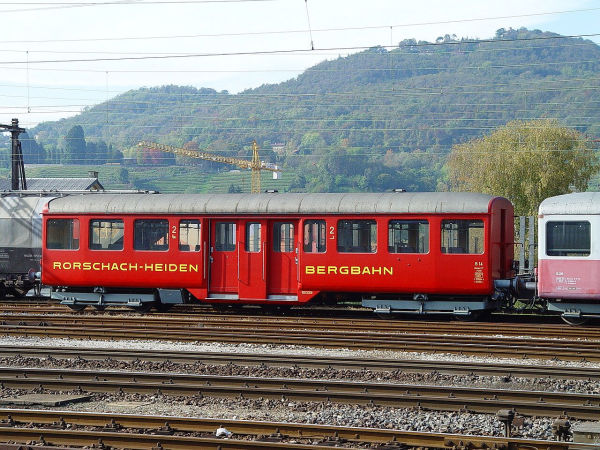
The old Rorschach-Heiden Bergbahn RHB was before 2006 a totally independent small railway, which started down by the lake Bodensee by the village
of Rorschach and then climbed up the steep hillside to the village of Heiden, very high up. Technically the railway is built like it would
be a part of the federal railways, that is, it is 1435 mm normal gauge and operates with 15 kV AC just like the federal railways, but as it
climbs, it uses a cog-wheel third rail system. It is totally separate from the rest of the Appenzeller Bahnen in terms of the physical place
but also because of the very different gauge and electric systems.
This coach is a historic RHB coach, which is nowadays taken care by the railways enthusiasts in southern Switzerland, in Mendrisio. It has been
put back into the lustre that it had sometime in the 1960s.
Picture from Mendrisio 20.10.2002 by Ilkka Siissalo.
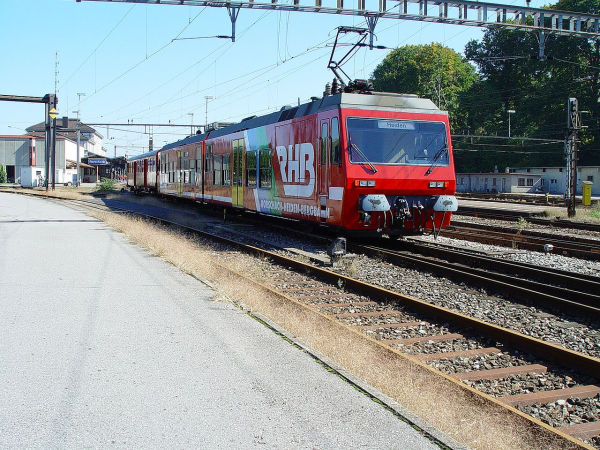
This two-coach motor wagon BDeh 3/6 was brand new in 2002 when this picture was taken and it was the most modern piece of equipment on the small
RHB railway. Here we see it just leaving Rorschach station. It is rolling here on the rail line of Swiss federal railways SBB. The motor wagon
was built by Stadler and it was based on the technology of Stadler's famous GTW 2/6 trains, but it was already of a more modern design as it had its
motors placed in the coaches themselves, not in a separate power pack module like the early GTW trains did. This train is the only one of its kind. After
2006 when RHB was fused into Appenzeller Bahnen, it just got the traditional red and white AB livery.
Picture from Rorschach 29.9.2002 by Ilkka Siissalo.

Driver's cab of the then new motor wagon BDeh 3/6 no.25.
Picture from Rorschach 29.9.2002 by Ilkka Siissalo.
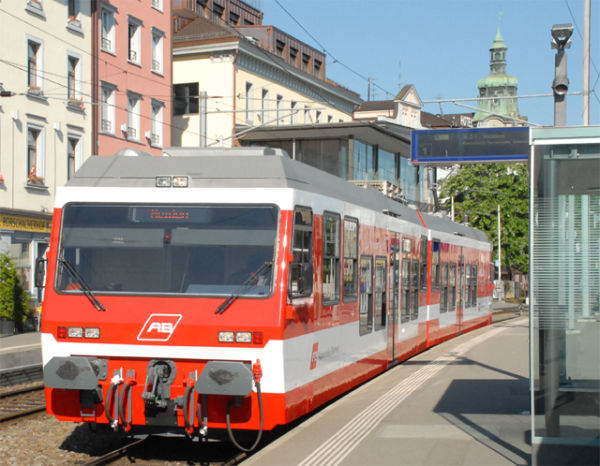
The same BDeh 3/6 no.25 as shown above, now painted in the colours of Appenzeller Bahnen. Picture from Rorschach harbour in 6.6.2010 by Jan Oosterhuis.
This file is licensed under the Creative Commons Attribution-Share Alike 3.0 Unported, 2.5 Generic, 2.0 Generic and 1.0 Generic license.
Copyright Jan Oosterhuis [CC BY-SA (https://creativecommons.org/licenses/by-sa/3.0)]
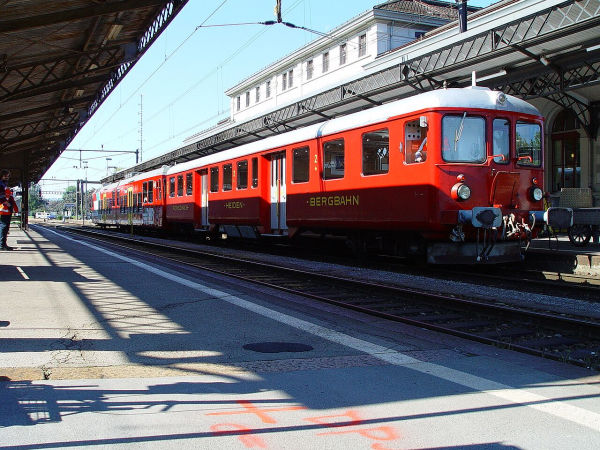
Whenever the capacity of the new BDeh 3/6 no.25 was not enough as such, it could easily be extended by adding a 1960s steering cab coach Bt 31. This Bt 31
was based on a design that was typical in local trains around Zürich in early 1960s. It was bought used from the Bodensee-Toggenburgbahn.
Picture from Rorschach 29.9.2002 by Ilkka Siissalo.
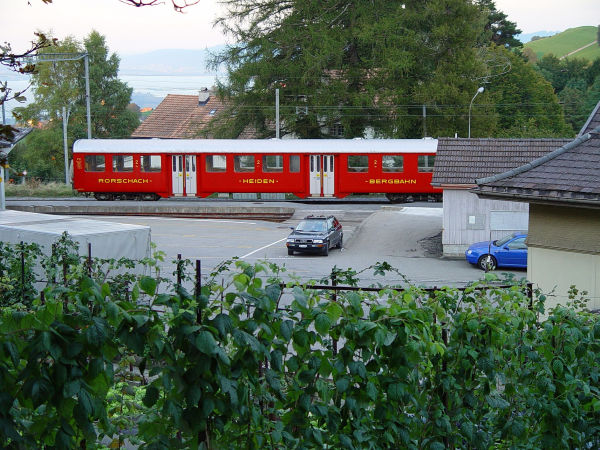
Side view of the same Bt 31 steering cab coach ex. Bodensee-Toggenburgbahn.
Picture from Heiden 28.9.2002 by Ilkka Siissalo.
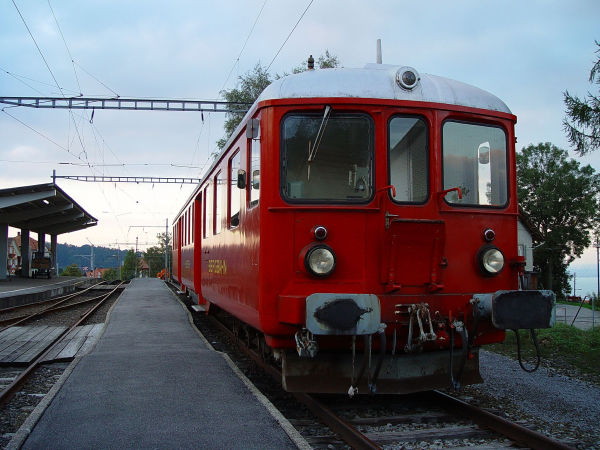
Front view of the same Bt 31 steering cab coach ex. Bodensee-Toggenburgbahn.
Picture from Heiden 28.9.2002 by Ilkka Siissalo.
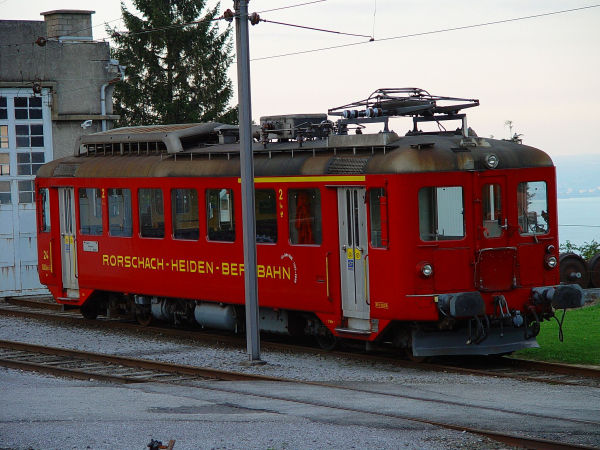
The Rorschach-Heiden Bergbahn had also two older motorwagons, which took care of all the traffic before RHB got their new double motorwagon BDeh 3/6 pictured
above. These were the ABDeh 2/4 no.23 and 24. They were fairly similar, but no. 23 was from 1953. No. 24 was much newer and was from 1967. This one is the
newer no. 24.
Picture from Heiden 28.9.2002 by Ilkka Siissalo.
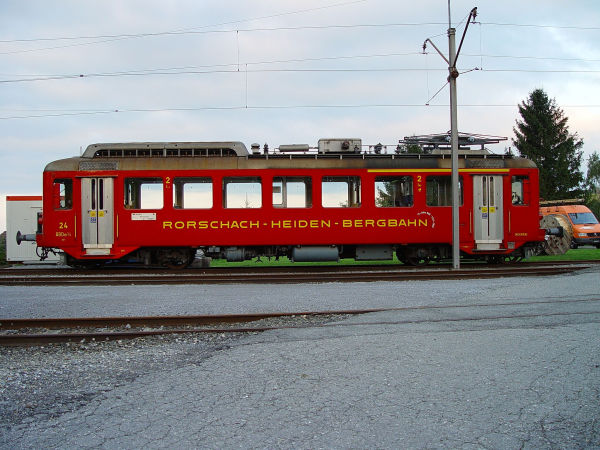
Side view of the ABDeh 2/4 no.24 from 1967. Note the yellow line by the roofside at one end of the wagon. It denotes where the first class once was, although here the
whole motorwagon had already been declassified as second class.
Picture from Heiden 28.9.2002 by Ilkka Siissalo.
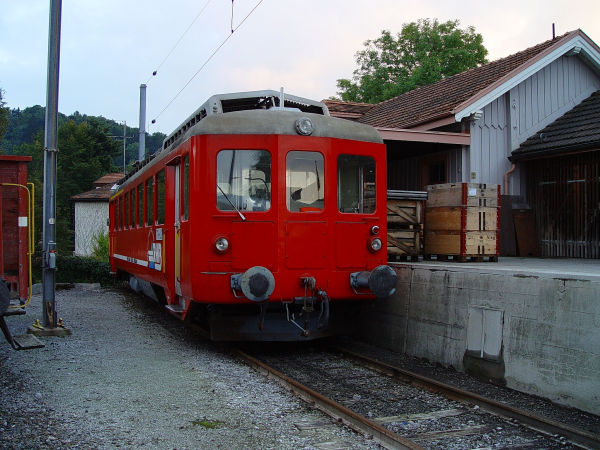
This is the older one of the two old motorwagons, ABDeh 2/4 no.23 from 1953. Note that its front is less rounded than the one of its 1960s sister. Actually these
front shapes are exactly the same that can be seen for example in the trains of BLS Lötschbergbahn from the same era. This is the typical 1940s-1050s front.
Picture from Heiden 28.9.2002 by Ilkka Siissalo.
The former Rheineck-Walzenhausen Bergbahn RhW

The Rheineck-Walzenhausen Bergbahn is a very peculiar and very small railroad. And very nonstandard. It used to be a company of its own, but it was fused to
Appenzeller Bahnen in 2006 at the same time as Rorschach-Heiden Bergbahn was. Basically RhW is just a 1,96 km long piece of railroad from Rheineck down by the
river more or less straight uphill to Walzenhausen which is about 270 metres higher up. The rail gauge is a totally nonstandard 1200 mm. The whole railroad
is just one straight line with the exception of just one switch down by Rheineck and that is only for the train to reach its small depot house. The only train
is just one small motorwagon which operates with 600 V DC from an overhead catenary wire. In the beginning the whole thing used to be a funicular and the present
day motorwagon used to be one of the funicular's two coaches. The wagon was built in 1958. Except for a short 670 metres piece downhill near the station of Rheineck,
the whole line is built with a rack rail cog wheel drive system of the so called system Riggenbach. The whole thing is just like a lift and there have been
several plans to totally automate it or to replace it with a bus service. The rail line is very steep, it has a maximum gradient of 250 promilles (25%).
Here is the only train of RhW, the motorwagon BDhe 1/2 no.1 is approaching its upper station at Walzenhausen 29.9.2002. Picture by Ilkka Siissalo.
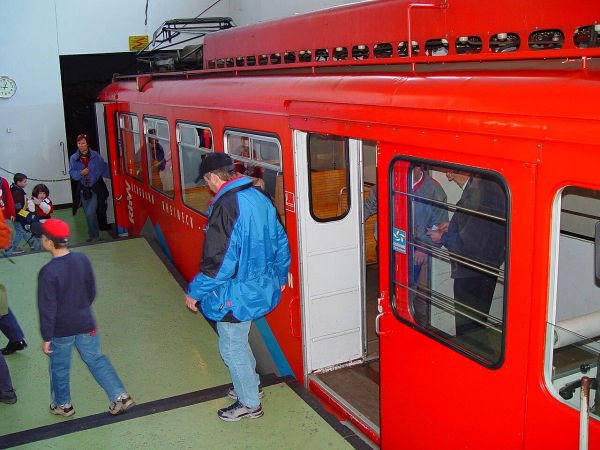
Passengers are exiting the motorwagon at Walzenhausen upper station. On normal workdays the small wagon runs up and down 24 times a day, on Sundays just 21
times a day.
Picture by Ilkka Siissalo, Walzenhausen 29.9.2002.
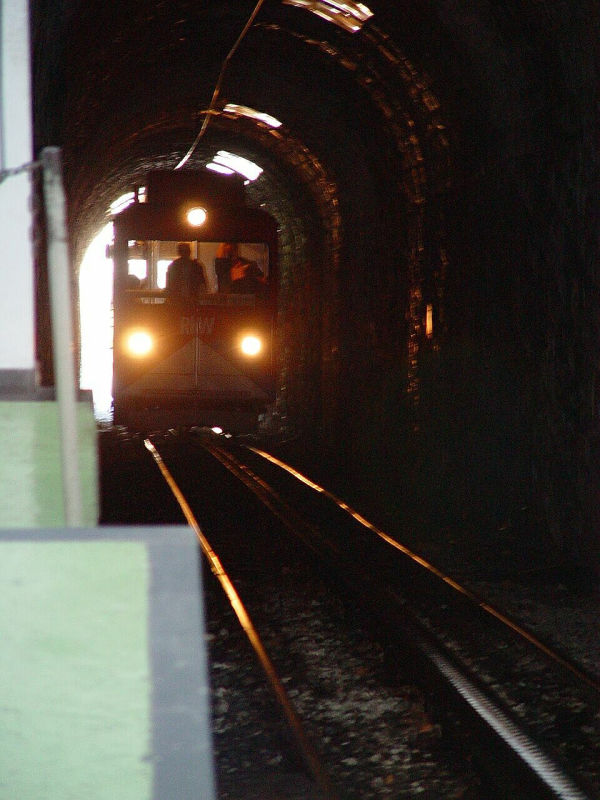
Here the only train of RhW is again approaching the upper end station of Walzenhausen.
Picture by Ilkka Siissalo, Walzenhausen 29.9.2002.
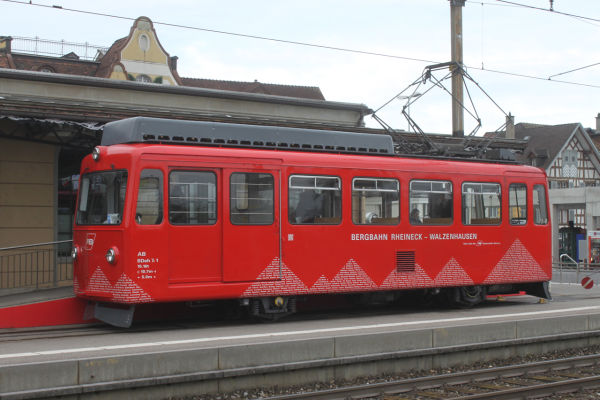
Appenzeller Bahnen took over the company RhW in 2006 and in 2014 AB let thoroughly modernise the only motorwagon of this small railroad. This is a picture
of it after modernisation. Here we see the little train down by the station at Rheineck 7.11.2014. The picture is taken and published by Wikimedia Commons
user "NAC".
This file is licensed under the Creative Commons
Attribution-Share Alike 4.0 International
license. Copyright user "NAC" of Wikimedia Commons.
The former Trogenerbahn TB
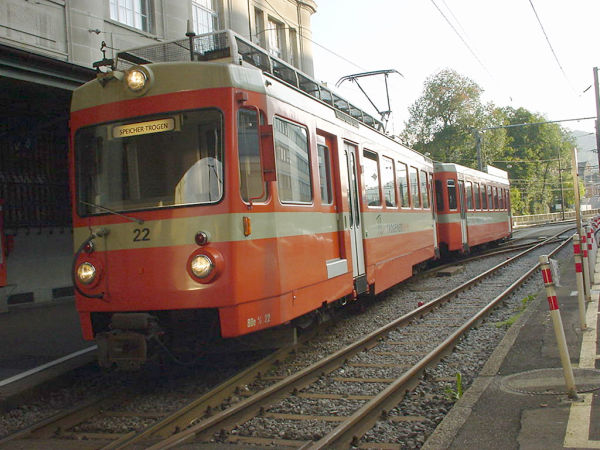
The former Trogenerbahn was more like a tram than a real railway. It ran from the city center of St.Gallen via Speicher to Trogen. Rail gauge was the same as with
Appenzeller Bahnen, but the electric system used was just 600 V DC. The tram-trains of Trogenerbahn were fairly old. This was a very typical composition: one motor
wagon plus one trailer and a driver's cab at both ends of the composition. After Appenzeller Bahnen took over Trogenerbahn, the route was converted to 1500 V DC
and combined together with AB's route St.Gallen-Appenzell. Scroll up to see a picture of the new tram-trains of the route.
Picture from St.Gallen main station 28.9.2002 by Sanna Siissalo.
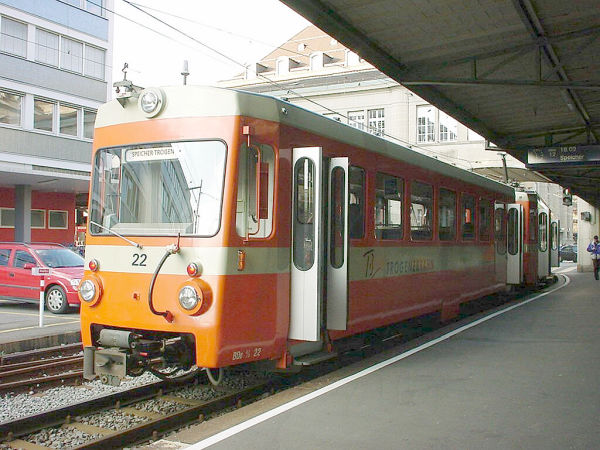
Trogenerbahn's tram-train BDe 4/4 no.22 is waiting for passengers to board.
Picture from St.Gallen main station 28.9.2002 by Sanna Siissalo.

